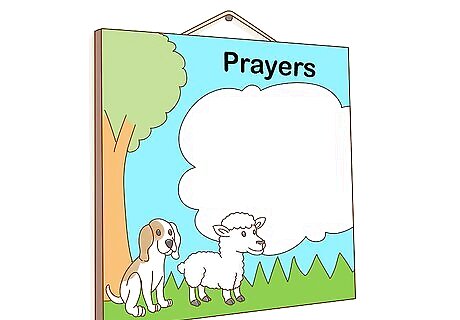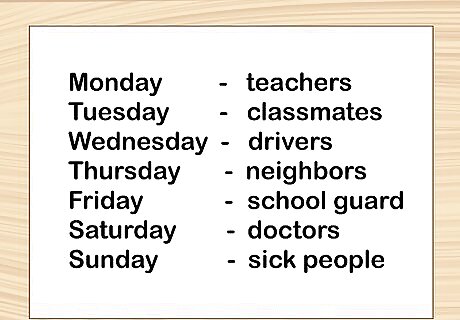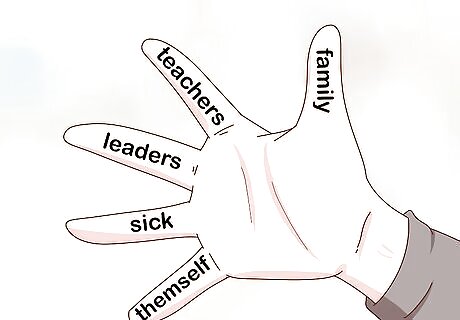
views
Teaching the Basics of Prayer

Discuss what it means to pray and talk to God. Explain that prayer is a form of spiritual communication between a person and God, and it can help them strengthen their relationship with God. Teach them that they can pray in times of happiness, trouble, or sickness, and they can even ask for forgiveness for hurtful things that they have done. If it is a part of your religion, explain that God always listens and answers prayers, but not always as expected. It can be confusing for a child if they pray for something but they can't immediately see the results.

Use the Lord's Prayer as an example of what to include in a prayer. This prayer includes all of the elements of a good prayer, although they may be hard to explain to a child. Ask them to try to include some praise, a confession, something they're thankful for, and a request of some sort in their prayers each day. The Lord's Prayer for Christians goes, “Our Father in heaven, hallowed be your name. Your kingdom come, your will be done, on Earth as it is in heaven. Give us this day our daily bread, and forgive us our debts, as we also have forgiven our debtors. And lead us not into temptation, but deliver us from evil.” This prayer will likely be different between different religions and denominations.

Encourage young children to start with simple prayer statements. It might be easier for toddlers and preschoolers to focus on thankfulness and forgiveness. Ask them to think about something that they're thankful for and something that they want forgiveness for. This is a great way to build up to more complex prayers. For example, have them start their prayers with “I thank God for…” or “I pray for…” so they can build sentences like, “I thank God for my family and home” or “I pray for a good day tomorrow.”

Practice praying together to lead by example. Try to make praying a part of your child's daily routine with you, and show them how you pray. Say your prayer out loud first, and then encourage them to do the same. Keep your prayer honest but upbeat so they have a good idea of your positive relationship with God. This can also be a great way to show your child how to stand or sit during prayer, especially if your faith requires special movements for prayer.Keep in mind that your child will have their own relationship with God, and it may be different than your own.
Using Activities and Games

Create a prayer board with pictures of things your child can pray for. Help your child cut pictures out of magazines or print them off of the Internet. Use glue to stick them to a piece of poster board, and use markers, crayons, and other decorations to make the board look pretty. Hang it up where you normally pray, and have them pick 1-2 things off of the board to pray for each day. For example, if they like animals, you can include pictures of dogs and cats or family pets. You can also include pictures of your family, friends, and classmates so they can pray for them every day as well.Tip: Switch out the pictures according to the seasons. For instance, during the holidays you can add pictures of people of different religions and talk about how people celebrate different holidays. Then, you can say a prayer for world peace and happiness.

Pick a random place on the map and pray for that area. Get a globe or a wall map, and have your child close their eyes. Let them point to a spot on the map, and then do some research about that area. If there's conflict or unrest in that area, talk about it, and then ask them to pray for peace and happiness. If there's no unrest, you can still pray for continued peace and prosperity. This is a great way to teach children to be aware of different cultures, religions, and world news. Remember to keep your research simple and age-appropriate. If there's a conflict going on in that area, tell them generally about it, and let them ask questions. For example, you could say, “That country is having a war and a lot of families are being separated. Why don't we pray for those families to be reunited?”

Use “forgiveness stones” to help children let go of hurtful things. Fill a bucket with clean water, and gather a few stones from outside. Have the child pick up the stone and think about something that someone did to hurt them recently. Then, when they've prayed about it for a moment, let them drop the stone into the water to symbolize their forgiveness of that person. Remind them that they don't have to share their prayer out loud if they don't want to. Sometimes, they might want to have a private conversation with God about why they felt hurt. You can also talk to them about how they can forgive people just like God forgives them when they do something hurtful.
Praying for Others

Assign a different day of the week to pray for different people. Make a prayer calendar for each day of the week, and assign general groups of people for each day. On that day, have your child think about people in that group who have helped them in their life, and choose 1 or 2 people to pray for. For instance, you might have Monday be “teachers,” and include people like school teachers, coaches, pastors, and other instructors. Then, they can choose someone from that list, and say a prayer for their health and happiness.

Let your child pick a friend or family member to pray for each day. If you're having trouble getting your child to understand praying for others, talk to them about their friends and family. Choose someone in your family, like an aunt, uncle, grandparent, or sibling, or someone else that they're close with, such as a friend, and let them know that they can ask God to protect that person through prayer. For instance, you might say, “Your friend Alex was sick and missed school today. Do you want to pray for Alex to get better so she can come back to school?” If you want to pray for a family member, try saying something like, “Uncle Joe is coming to visit for Thanksgiving. We can pray that he has a safe trip and enjoys his time with us.”

Use the “Five Finger” method to pray for other people. Have your child hold out their hand, and assign a person to each finger. Ask them to pray for 5 different people before praying for themself. This shows them that they can pray for others as well as their own happiness and relationship with God. The Five Finger Method Thumb: Someone close to them, like a parent or friend. Index finger: Someone who points them in the right direction, like a teacher or babysitter. Middle finger: Someone in a leadership position, such as a principal or the leader of your country. Ring finger: Someone who is having family troubles, such as a friend who lost a family member. Pinky finger: A friend and themself.




















Comments
0 comment